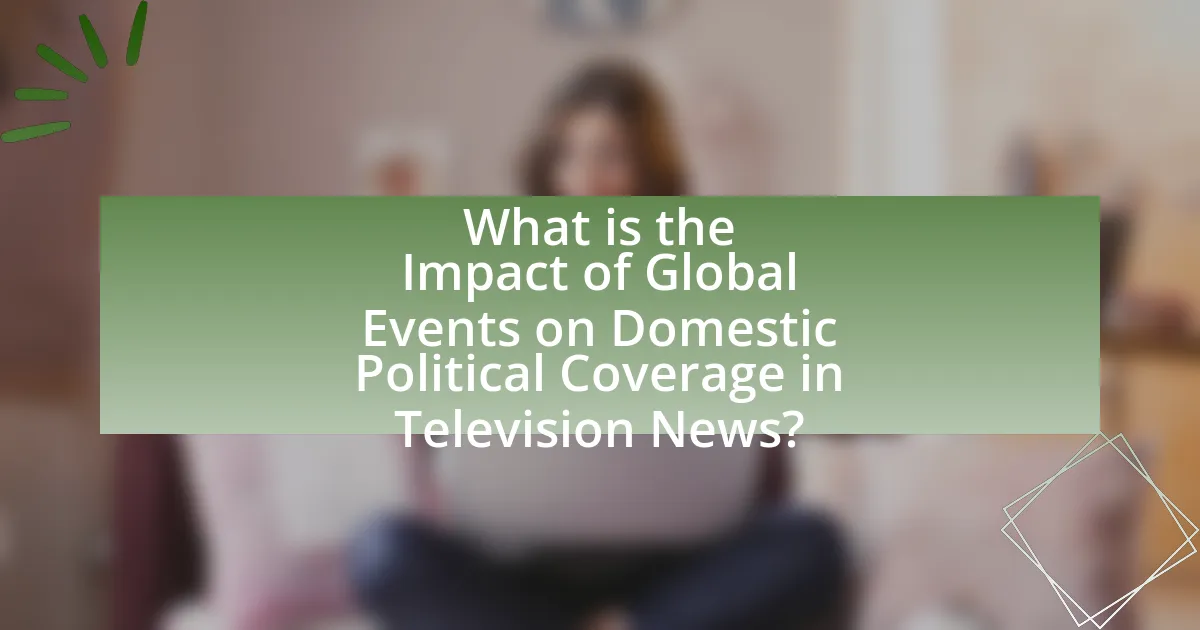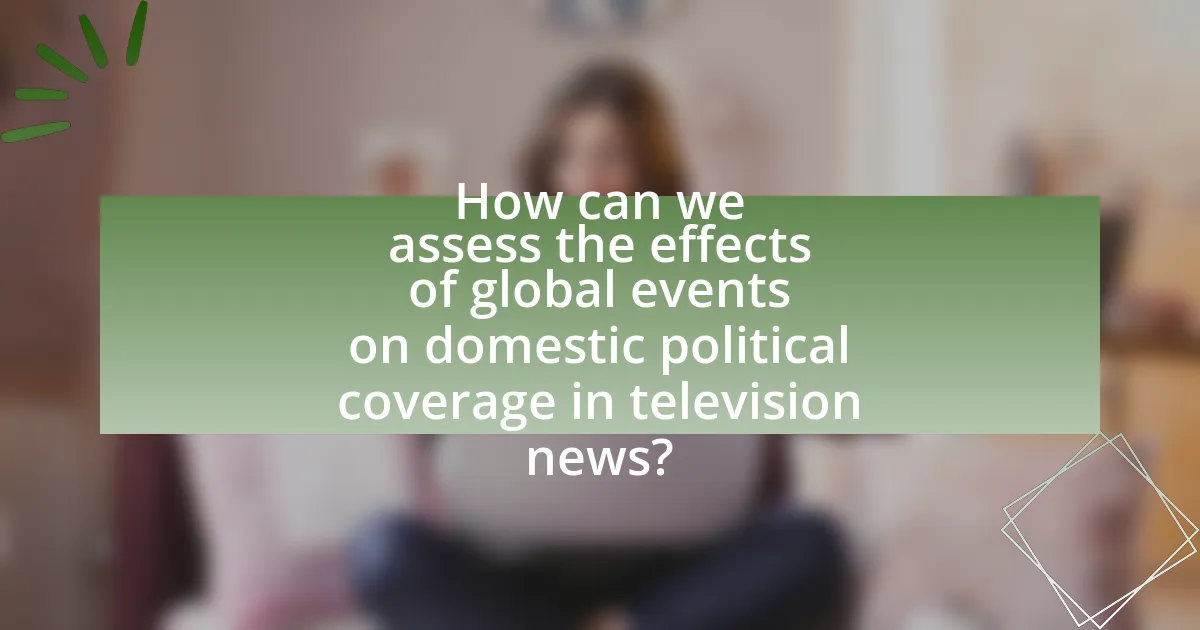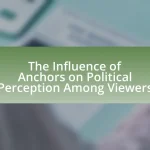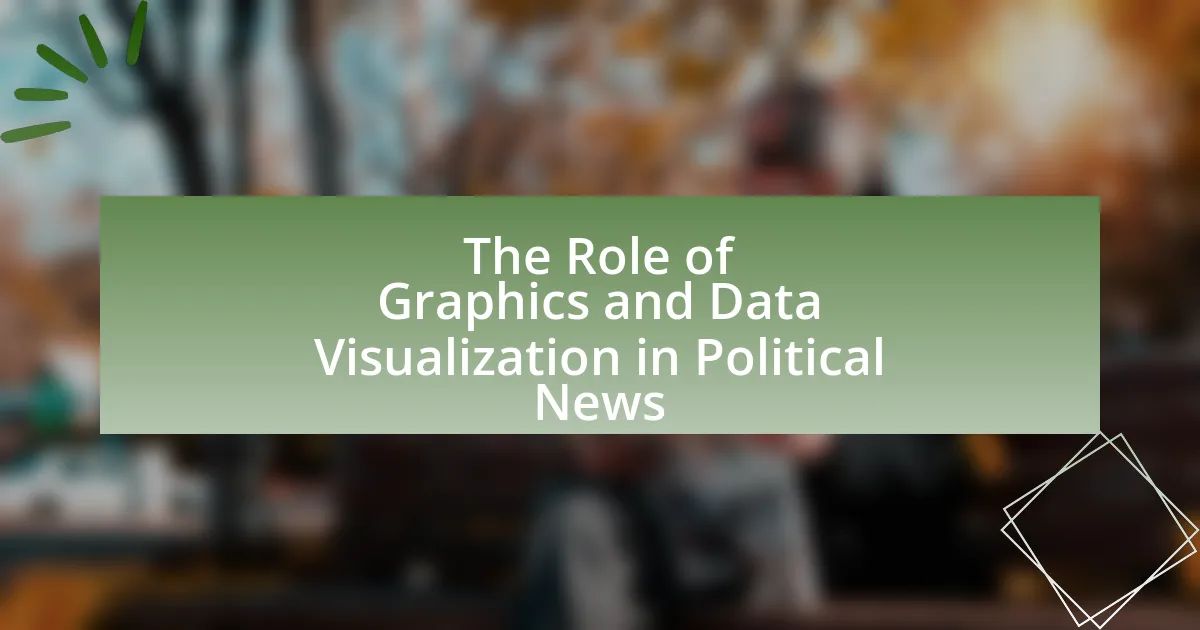The article examines the impact of global events on domestic political coverage in television news, highlighting how international crises, such as the COVID-19 pandemic and geopolitical conflicts, shift media focus and alter public discourse. It discusses mechanisms like agenda-setting and framing that influence how domestic political issues are perceived in relation to global occurrences. Key findings indicate that significant global events can lead to a reduction in local political coverage, affecting public awareness and engagement with domestic governance. The article also explores the implications for political accountability and voter participation, emphasizing the need for balanced reporting that connects global issues to local contexts.

What is the Impact of Global Events on Domestic Political Coverage in Television News?
Global events significantly influence domestic political coverage in television news by shifting the focus of reporting and altering public discourse. For instance, during major international crises, such as the COVID-19 pandemic or geopolitical conflicts, television news often prioritizes these events, which can lead to a reduction in coverage of local political issues. Research indicates that when global events dominate headlines, domestic political narratives may be framed in relation to these events, affecting how audiences perceive local governance and policy decisions. A study by the Pew Research Center found that during significant global events, 60% of news coverage shifted towards international stories, impacting the visibility of domestic political matters. This demonstrates that global events can reshape the landscape of political reporting, influencing both media priorities and public perception.
How do global events influence the framing of domestic political issues?
Global events significantly influence the framing of domestic political issues by shaping public perception and media narratives. For instance, during the COVID-19 pandemic, the global health crisis prompted governments to prioritize public health policies, which in turn affected domestic political debates on healthcare funding and crisis management. Research indicates that media coverage of international events, such as climate change or geopolitical conflicts, often leads to increased public awareness and alters the political discourse surrounding related domestic policies. This phenomenon is evident in how the 2008 financial crisis shifted discussions on economic regulation and social safety nets in various countries, demonstrating that global events can catalyze changes in domestic political priorities and framing.
What are the key global events that typically affect domestic political coverage?
Key global events that typically affect domestic political coverage include international conflicts, economic crises, and significant climate events. International conflicts, such as wars or military interventions, often lead to increased scrutiny of government policies and foreign relations, as seen during the Iraq War in 2003, which shifted media focus on national security and military spending. Economic crises, like the 2008 financial meltdown, prompt discussions on domestic economic policies and government accountability, influencing political narratives and voter sentiment. Significant climate events, such as hurricanes or wildfires, can shift political discourse towards environmental policies and disaster preparedness, as evidenced by the media coverage following Hurricane Katrina in 2005, which highlighted governmental response and accountability. These events create a framework within which domestic political issues are analyzed and reported, shaping public perception and political agendas.
How does the media’s portrayal of global events shape public perception of domestic politics?
The media’s portrayal of global events significantly shapes public perception of domestic politics by framing issues in a way that influences audience understanding and opinion. For instance, when the media emphasizes international crises, such as conflicts or humanitarian disasters, it often leads the public to draw parallels with domestic issues, prompting them to view their government’s policies through the lens of global responsibility. Research indicates that coverage of events like the Syrian refugee crisis has led to increased public support for humanitarian policies in various countries, demonstrating how global narratives can directly impact domestic political attitudes. Furthermore, studies show that sensationalized reporting on global terrorism can heighten public fear and influence domestic security policies, as seen in the aftermath of events like the Paris attacks in 2015, which shifted public opinion towards more stringent national security measures.
Why is it important to analyze the relationship between global events and domestic political coverage?
Analyzing the relationship between global events and domestic political coverage is crucial because it reveals how international occurrences influence national narratives and public opinion. For instance, events like the COVID-19 pandemic or geopolitical conflicts often shape domestic policy discussions and media framing. Research indicates that media coverage of global crises can lead to increased public awareness and engagement with related domestic issues, as seen during the 2008 financial crisis when global economic instability prompted significant political discourse in various countries. Understanding this relationship helps identify patterns in media reporting and its effects on political behavior, thereby enhancing the comprehension of how global dynamics impact local governance and citizen responses.
What role does television news play in informing the public about domestic politics during global events?
Television news plays a critical role in informing the public about domestic politics during global events by providing timely updates, analysis, and context that connect international occurrences to local political implications. For instance, during the COVID-19 pandemic, television news outlets reported on government responses, public health policies, and economic impacts, thereby shaping public understanding of how global health crises affect domestic governance. Research indicates that 70% of Americans rely on television as their primary source of news, highlighting its influence in shaping political perceptions and informing citizens about how global events can alter domestic political landscapes.
How can understanding this impact help in evaluating media bias?
Understanding the impact of global events on domestic political coverage in television news can significantly aid in evaluating media bias by revealing how external influences shape narrative framing. For instance, when a major international crisis occurs, media outlets may prioritize coverage that aligns with their political affiliations or audience expectations, leading to selective reporting. Research indicates that during events like the Iraq War, U.S. media often displayed bias by emphasizing government perspectives while downplaying dissenting voices, thus skewing public perception. This understanding allows analysts to critically assess whether coverage is comprehensive or disproportionately reflects specific viewpoints, ultimately highlighting potential biases in reporting.

What are the mechanisms through which global events affect domestic political coverage?
Global events influence domestic political coverage through mechanisms such as agenda-setting, framing, and the transfer of public opinion. Agenda-setting occurs when media prioritize global issues, prompting domestic outlets to cover these topics, thereby shaping public discourse. For instance, the coverage of the COVID-19 pandemic highlighted international responses, which in turn affected how domestic policies were perceived and reported. Framing involves presenting global events in a way that influences interpretation; for example, portraying international conflicts can sway domestic political narratives and voter sentiment. Additionally, the transfer of public opinion happens when citizens draw parallels between global events and local issues, leading to shifts in political priorities and media focus. This interconnectedness is evident in how the Black Lives Matter movement in the U.S. was influenced by global protests against racial injustice, prompting extensive domestic media coverage.
How do news cycles change in response to significant global events?
News cycles shift rapidly in response to significant global events, often prioritizing coverage of these events over other news. For instance, during the COVID-19 pandemic, news outlets worldwide focused extensively on health updates, government responses, and economic impacts, leading to a decrease in coverage of local political issues. This shift is evidenced by Nielsen data, which showed a 50% increase in news viewership during the early months of the pandemic, indicating heightened public interest in global events. Additionally, significant events like natural disasters or international conflicts can lead to a reallocation of resources within news organizations, resulting in a temporary suspension of regular programming to provide continuous coverage. This pattern demonstrates that major global occurrences can dominate news cycles, influencing the topics and narratives presented to the public.
What are the effects of breaking news on the coverage of domestic political stories?
Breaking news significantly alters the coverage of domestic political stories by shifting media focus and prioritizing urgent events over ongoing political narratives. This phenomenon occurs because news outlets often prioritize breaking stories that attract immediate viewer attention, leading to a reduction in the depth and frequency of coverage for domestic political issues. For instance, during major global events, such as natural disasters or international conflicts, television news channels may allocate more airtime to these stories, resulting in less comprehensive reporting on domestic political developments. Research indicates that this shift can lead to decreased public awareness of important political issues, as audiences may become less informed about local governance and policy changes during periods dominated by breaking news.
How do journalists prioritize stories during global crises?
Journalists prioritize stories during global crises by assessing the urgency, relevance, and potential impact of the events on their audience. They focus on immediate threats to public safety, significant political developments, and humanitarian issues, often guided by the principle of serving the public interest. For instance, during the COVID-19 pandemic, news outlets prioritized health updates, government responses, and economic implications, reflecting the pressing concerns of their viewers. This prioritization is supported by audience engagement metrics, which indicate that stories with direct implications for public welfare receive higher viewership and engagement, reinforcing the need for timely and relevant reporting.
What are the implications of this impact for political accountability?
The implications of the impact of global events on domestic political coverage in television news for political accountability are significant, as they can enhance or undermine the scrutiny of political leaders. When global events dominate news coverage, they may shift public attention away from local political issues, reducing the pressure on politicians to be accountable for their actions. For instance, during crises such as natural disasters or international conflicts, media focus often pivots to these events, potentially allowing political leaders to evade scrutiny over domestic policies or scandals. This phenomenon can lead to a decrease in informed public discourse, as citizens may become less aware of local governance issues, ultimately weakening democratic accountability.
How does the focus on global events distract from local political issues?
The focus on global events distracts from local political issues by shifting media attention and public discourse away from community-specific concerns. When news outlets prioritize international stories, such as conflicts or global economic crises, they often allocate fewer resources and airtime to local governance, elections, and policy debates. For instance, a study by the Pew Research Center found that local news coverage has declined significantly, with many local stations dedicating only a fraction of their broadcasts to local issues, often overshadowed by global narratives. This imbalance can lead to a lack of public awareness and engagement with local political matters, ultimately affecting voter turnout and civic participation in local governance.
What are the potential consequences for voter engagement and political participation?
The potential consequences for voter engagement and political participation include increased awareness and mobilization among citizens, as well as potential disenfranchisement due to perceived barriers. When global events are covered extensively in domestic political news, they can stimulate public interest and encourage individuals to participate in the electoral process, as evidenced by the spike in voter turnout during significant international crises, such as the 2008 financial crisis, which saw a 5% increase in voter participation in the U.S. Conversely, if citizens feel that their voices are not represented or that the political system is unresponsive, it may lead to apathy and decreased participation, as shown by the decline in voter turnout in the U.S. from 2008 to 2016, where participation dropped from 61.6% to 58.0%. Thus, the interplay between global events and domestic political coverage can significantly shape voter engagement and political participation outcomes.

How can we assess the effects of global events on domestic political coverage in television news?
To assess the effects of global events on domestic political coverage in television news, one can analyze the frequency and context of global event reporting alongside domestic political narratives. Research indicates that significant global events, such as international conflicts or economic crises, often lead to increased coverage of related domestic political issues, as seen during the 2008 financial crisis when U.S. news outlets heightened focus on economic policies and political responses. By employing content analysis methods, researchers can quantify changes in coverage patterns, revealing how global events shape the framing of domestic political discourse. Additionally, audience reception studies can provide insights into how viewers perceive the relationship between global events and domestic politics, further validating the impact of these events on television news coverage.
What methodologies can be used to study this impact?
Quantitative content analysis and qualitative interviews are methodologies that can be used to study the impact of global events on domestic political coverage in television news. Quantitative content analysis allows researchers to systematically evaluate news broadcasts, measuring variables such as frequency of coverage, framing, and tone related to global events. For instance, a study might analyze the number of segments dedicated to a global crisis and how they correlate with domestic political narratives. Qualitative interviews with journalists and editors can provide insights into editorial decisions and perceived influences of global events on domestic reporting. This combination of methodologies offers a comprehensive understanding of how global occurrences shape local political discourse in television news.
How can content analysis reveal shifts in coverage patterns?
Content analysis can reveal shifts in coverage patterns by systematically examining the frequency and context of specific topics, themes, or narratives within media content over time. This method allows researchers to quantify changes in how often certain global events are reported in relation to domestic political issues, highlighting trends such as increased focus on international crises or shifts in public sentiment. For instance, a study analyzing television news coverage during significant global events, like the COVID-19 pandemic, may show a marked increase in reporting on health policy and its political implications, indicating a shift in coverage priorities. Such findings can be validated by comparing data sets from different time periods, demonstrating how external events influence media narratives and public discourse.
What role do audience reception studies play in understanding this impact?
Audience reception studies play a crucial role in understanding the impact of global events on domestic political coverage in television news by analyzing how viewers interpret and respond to news content. These studies provide insights into audience perceptions, preferences, and the contextual factors that shape their understanding of political narratives. For instance, research has shown that audience demographics, such as age and political affiliation, significantly influence how news is received and interpreted, affecting the overall impact of global events on domestic political discourse. By examining viewer feedback and engagement, audience reception studies help identify trends in public opinion and the effectiveness of news framing, thereby revealing the broader implications of global events on local political landscapes.
What best practices can television news organizations adopt to balance global and domestic coverage?
Television news organizations can adopt several best practices to balance global and domestic coverage effectively. First, they should implement a structured editorial framework that prioritizes both types of news equally, ensuring that global events are contextualized within domestic implications. For instance, during significant international crises, news organizations can highlight how these events affect local communities, thereby maintaining viewer relevance.
Additionally, utilizing data analytics can help organizations understand audience preferences, allowing them to tailor content that resonates with viewers while still covering essential global stories. Research indicates that audiences are more engaged when they see the connection between global issues and their daily lives, which reinforces the importance of this approach.
Furthermore, fostering partnerships with international news agencies can enhance the depth of global coverage while allowing domestic stories to remain a focal point. This collaboration can provide a broader perspective without overwhelming viewers with foreign news, thus maintaining a balanced news diet.
By adopting these practices, television news organizations can ensure that they provide comprehensive coverage that respects both global and domestic narratives, ultimately leading to a more informed audience.
How can news outlets ensure comprehensive reporting during global events?
News outlets can ensure comprehensive reporting during global events by employing a multi-faceted approach that includes collaboration with international correspondents, utilizing diverse sources, and leveraging technology for real-time updates. Collaboration with international correspondents allows news outlets to gain firsthand insights and local perspectives, which enhances the depth of coverage. Utilizing diverse sources, including government reports, expert analyses, and eyewitness accounts, ensures a well-rounded narrative that captures various viewpoints. Additionally, leveraging technology, such as social media and live streaming, enables news outlets to provide timely updates and engage with audiences effectively. This approach is supported by the fact that comprehensive reporting leads to a more informed public, as seen during events like the COVID-19 pandemic, where diverse reporting helped contextualize the global impact on local politics and policies.
What strategies can be implemented to maintain political accountability in coverage?
Implementing transparency in reporting is a key strategy to maintain political accountability in coverage. This can be achieved by disclosing sources, providing context for political decisions, and ensuring that reporting is fact-checked and unbiased. For instance, the use of independent fact-checking organizations, such as PolitiFact, enhances credibility by verifying claims made by political figures. Additionally, encouraging public engagement through forums and social media allows citizens to question and hold media accountable for their coverage. Research indicates that media transparency correlates with increased public trust, as seen in studies conducted by the Pew Research Center, which highlight that audiences are more likely to trust news outlets that openly share their reporting processes.




